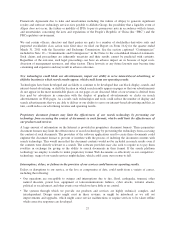Yahoo 2011 Annual Report Download - page 25
Download and view the complete annual report
Please find page 25 of the 2011 Yahoo annual report below. You can navigate through the pages in the report by either clicking on the pages listed below, or by using the keyword search tool below to find specific information within the annual report.• the difficulty of integrating operations, systems, and controls as a result of cultural, regulatory, systems, and
operational differences;
• in the case of foreign acquisitions and investments, the impact of particular economic, tax, currency, political,
legal and regulatory risks associated with specific countries; and
• the impact of known potential liabilities or liabilities that may be unknown, including as a result of inadequate
internal controls, associated with the companies we acquired or in which we invested.
We are likely to experience similar risks in connection with our future acquisitions and strategic investments.
Our failure to be successful in addressing these risks or other problems encountered in connection with our past
or future acquisitions and strategic investments could cause us to fail to realize the anticipated benefits of such
acquisitions or investments, incur unanticipated liabilities, and harm our business generally.
Any failure to manage expansion and changes to our business could adversely affect our operating results.
We continue to evolve our business. As a result of acquisitions, and international expansion in recent years, more
than half of our employees are now based outside of our Sunnyvale, California headquarters. If we are unable to
effectively manage a large and geographically dispersed group of employees or to anticipate our future growth
and personnel needs, our business may be adversely affected.
As we expand our business, we must also expand and adapt our operational infrastructure. Our business relies on
data systems, billing systems, and financial reporting and control systems, among others. All of these systems
have become increasingly complex in the recent past due to the growing complexity of our business, acquisitions
of new businesses with different systems, and increased regulation over controls and procedures. To manage our
business in a cost-effective manner, we will need to continue to upgrade and improve our data systems, billing
systems, and other operational and financial systems, procedures, and controls. In some cases, we are outsourcing
administrative functions to lower-cost providers. These upgrades, improvements and outsourcing changes will
require a dedication of resources and in some cases are likely to be complex. If we are unable to adapt our
systems and put adequate controls in place in a timely manner, our business may be adversely affected. In
particular, sustained failures of our billing systems to accommodate increasing numbers of transactions, to
accurately bill users and advertisers, or to accurately compensate Affiliates could adversely affect the viability of
our business model.
Any failure to scale and adapt our existing technology architecture to manage expansion of user-facing
services and to respond to rapid technological change could adversely affect our business.
As some of the most visited sites on the Internet, Yahoo! Properties deliver a significant number of products,
services, page views, and advertising impressions to users around the world. The products and services offered
by us are expected to continue to expand and change significantly and rapidly in the future to accommodate new
technologies and Internet advertising solutions, and new means of content delivery.
In addition, widespread adoption of new Internet, networking or telecommunications technologies, or other
technological changes, could require substantial expenditures to modify or adapt our services or infrastructure.
The technology architectures and platforms utilized for our services are highly complex and may not provide
satisfactory security features or support in the future, as usage increases and products and services expand,
change, and become more complex. In the future, we may make additional changes to our, or move to completely
new, architectures, platforms and systems. Such changes may be technologically challenging to develop and
implement, may take time to test and deploy, may cause us to incur substantial costs or data loss, and may cause
delays or interruptions in service. These changes, delays, or interruptions in our service may cause our users,
Affiliates and other advertising platform participants to become dissatisfied with our service and move to
competing providers or seek remedial actions or compensation. Further, to the extent that demands for our
services increase, we will need to expand our infrastructure, including the capacity of our hardware servers and
the sophistication of our software. This expansion is likely to be expensive and complex and require additional
23
























